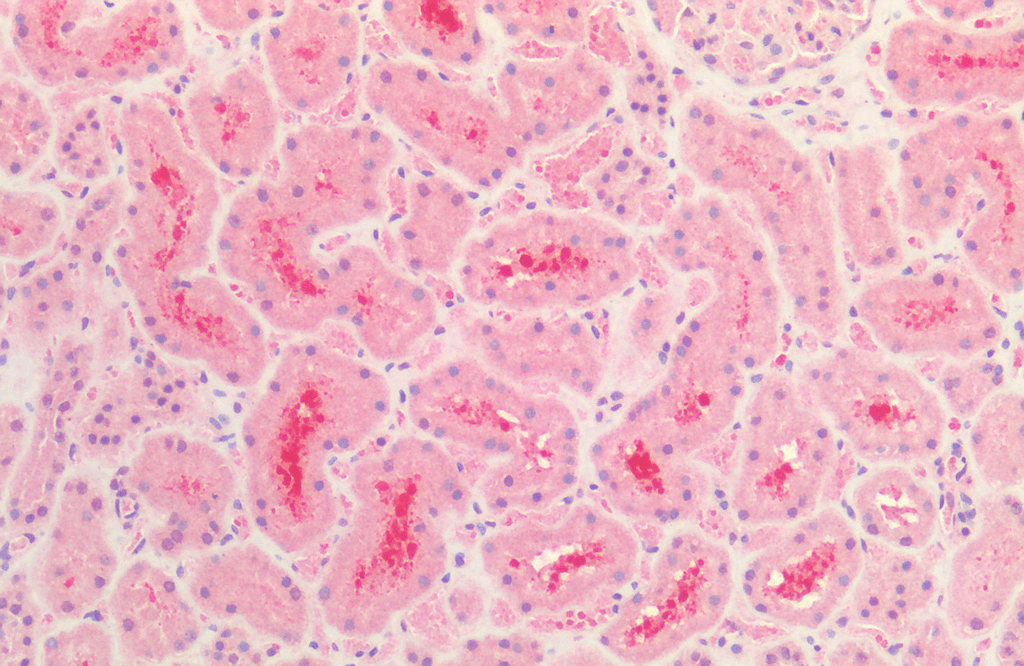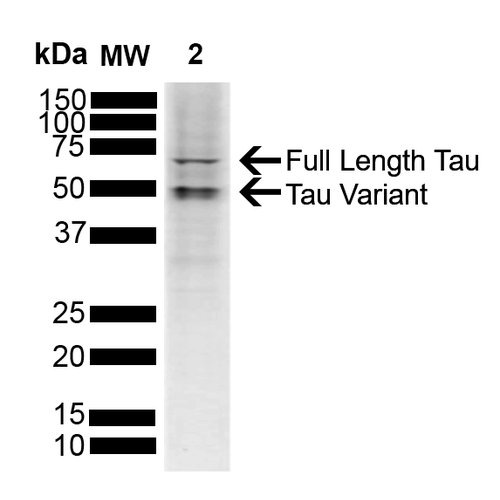Anti-Tau Antibody (57010)
Data
 Immunohistochemistry analysis using Rabbit Anti-Tau Polyclonal Antibody (57010). Tissue: Kidney. Species: Human. Fixation: Formalin fixed paraffin-embedded. Primary Antibody: Rabbit Anti-Tau Polyclonal Antibody (57010).
Immunohistochemistry analysis using Rabbit Anti-Tau Polyclonal Antibody (57010). Tissue: Kidney. Species: Human. Fixation: Formalin fixed paraffin-embedded. Primary Antibody: Rabbit Anti-Tau Polyclonal Antibody (57010). Western blot analysis of SH-SY5Y showing detection of ~45.8 kDa Tau protein using Rabbit Anti-Tau Polyclonal Antibody (57010). Lane 1: Molecular Weight Ladder (MW). Lane 2: SH-SY5Y. Load: 10 µg. Block: 5% Skim Milk powder in TBST. Primary Antibody: Rabbit Anti-Tau Polyclonal Antibody (57010) at 1:1000 for 2 hours at RT with shaking. Secondary Antibody: Goat anti-rabbit IgG:HRP at 1:4000 for 1 hour at RT with shaking. Color Development: Chemiluminescent for HRP (Moss) for 5 min in RT. Predicted/Observed Size: ~45.8 kDa. Other Band(s): 50 kDa, 65 kDa.
Western blot analysis of SH-SY5Y showing detection of ~45.8 kDa Tau protein using Rabbit Anti-Tau Polyclonal Antibody (57010). Lane 1: Molecular Weight Ladder (MW). Lane 2: SH-SY5Y. Load: 10 µg. Block: 5% Skim Milk powder in TBST. Primary Antibody: Rabbit Anti-Tau Polyclonal Antibody (57010) at 1:1000 for 2 hours at RT with shaking. Secondary Antibody: Goat anti-rabbit IgG:HRP at 1:4000 for 1 hour at RT with shaking. Color Development: Chemiluminescent for HRP (Moss) for 5 min in RT. Predicted/Observed Size: ~45.8 kDa. Other Band(s): 50 kDa, 65 kDa. - -
- -
Antibody DetailsProduct DetailsReactivity Species Human ⋅ Mouse Host Species Rabbit Immunogen Synthetic peptide derived from the full-length sequence of human Tau Product Concentration 1.0 mg/ml Formulation PBS, pH 7.4, 0.09% sodium azide, 50% glycerol. State of Matter Liquid Product Preparation Purified by Protein A affinity chromatography Storage and Handling This product is stable for at least one (1) year at -20°C. Regulatory Status For in vitro investigational use only. Not intended for therapeutic or diagnostic procedures. Country of Origin USA Shipping Next Day 2-8°C Applications and Recommended Usage? Quality Tested by Leinco ELISA: use at 1-10ug/ml with human Tau on the solid phase.
Immunoblotting: use at 1-5ug/ml. A band of ~45.8kDa is detected. Each investigator should determine their own optimal working dilution for specific applications. See directions on lot specific datasheets, as information may periodically change. DescriptionSpecificity This antibody recognizes human and mouse Tau. Background Tau is a subunit protein of one of the major markers of Alzheimer disease (AD), the neurofibrillary
tangles. Tau protein has many unusual properties, such as its number of structural
conformations and biochemical modifications (phosphorylation, proteolysis, and glycosylation),
and its many interaction partners (mainly microtubules, but also other cytoskeletal proteins,
kinases, and phosphatases, motor proteins, chaperones, and membrane proteins). The
aggregation of Tau is toxic in cell and animal models, but can be reversed by suppressing
expression or by aggregation inhibitors. Antigen DetailsFunction Promotes microtubule assembly and stability, and might be involved in the establishment and maintenance of neuronal polarity (PubMed:21985311). The C-terminus binds axonal microtubules while the N-terminus binds neural plasma membrane components, suggesting that tau functions as a linker protein between both (PubMed:21985311, PubMed:32961270). Axonal polarity is predetermined by TAU/MAPT localization (in the neuronal cell) in the domain of the cell body defined by the centrosome. The short isoforms allow plasticity of the cytoskeleton whereas the longer isoforms may preferentially play a role in its stabilization. {PubMed:21985311, PubMed:32961270}. NCBI Gene Bank ID UniProt.org Research Area Neuroscience References & CitationsTechnical Protocols |


